Great music shows are always happening around the Bay Area, but there's a particularly rich slate to be had this coming week:
George Schuller's Circle Wide -- Like Before, Somewhat After (Playscape, 2008)
 On the one hand, it makes sense that you wouldn't cover Keith Jarrett's "The Survivors' Suite" shot for shot. If it sounded exactly like the original, you'd go listen to the original. (Coltrane-covering bands, take note.)
On the other hand, it wasn't the combination of notes and chords that
made the album-length "Survivors' Suite" special.
It was the setting: the mood of the music, yes, but also the sense of strength amid bleakness, and the overhanging nuclear fears of the cold war. Even the album cover, with its simple yet fading, despairing tones, contributed.
On the one hand, it makes sense that you wouldn't cover Keith Jarrett's "The Survivors' Suite" shot for shot. If it sounded exactly like the original, you'd go listen to the original. (Coltrane-covering bands, take note.)
On the other hand, it wasn't the combination of notes and chords that
made the album-length "Survivors' Suite" special.
It was the setting: the mood of the music, yes, but also the sense of strength amid bleakness, and the overhanging nuclear fears of the cold war. Even the album cover, with its simple yet fading, despairing tones, contributed.
In other words, "Survivors' Suite" doesn't seem replicable. It's no wonder that Jarrett never produced any work similar, and possibly never wanted to.
But drummer George Schuller
gives "The Survivors' Suite" a shot on Like Before, Somewhat After. He comes close -- the opening guitar scratches from Brad Shepik evoke the proper
 loneliness and emptiness, and Donnie McCaslin tries his fiery best with a sax solo at the end of part one. If I hadn't heard the original, I'd consider it an intriguing track with an innovative base concept. Big ups to Schuller, then, for trying it, but I think the effort was a bit doomed. Leaving vibraphone off the menu might have helped, I think; those comforting strains might work well in the more placid opening to Part 2 but just pillow-smother the sense of dread that should be the source of strength in Part 1.
loneliness and emptiness, and Donnie McCaslin tries his fiery best with a sax solo at the end of part one. If I hadn't heard the original, I'd consider it an intriguing track with an innovative base concept. Big ups to Schuller, then, for trying it, but I think the effort was a bit doomed. Leaving vibraphone off the menu might have helped, I think; those comforting strains might work well in the more placid opening to Part 2 but just pillow-smother the sense of dread that should be the source of strength in Part 1.
The album is a noble cause, though. Going beyond "Survivors' Suite," it's a revival of several compositions from Jarrett's fertile 1970s period, when he ran a powerful, graceful quartet with Dewey Redman (sax), Charlie Haden (bass), and Paul Motian (drums).
I've had an amazing trek through used record stores discovering one album
after another from this group -- Bop-Be, Backhand, Mysteries,
The Judgement. All are filled with the lush, soulful piano sound
that drew so many listeners to Jarrett -- I think of it as a
"Harlem stroll" sound, although that's a random and probably ignorant
description -- but each album also has one Weird Song. It might be
Jarrett and Redman screeching away on recorders, or one long low
mysterious blur. The catalog, which I think was mostly on ABC/Impluse!,
did finally get documented with a CD box set; before that, I don't think
any of the albums had been rereleased on CDs easily available in the
United States. They're all worth seeking out -- especially Survivors' Suite, which, as I was saying, is a real departure.
Schuller, then, is doing good work by bringing a handful of these compositions
back to life.
For most of the tracks, Tom Beckham's vibraphone sound is a
welcome splash, taking in the piano parts and giving them a new voice.
McCaslin was already in this band, but based on his solo work, his sax
seems a decent choice for this kind of project.
Shepik's guitar adds some nice depth -- I don't think Jarrett ever used a
For a serious listener/collector, the thing to do is probably to chase
down the old Jarrett albums. But Schuller's CD is going to be easier
to find -- possibly cheaper, if you don't want to seek out Jarrett on
vinyl. And I'd assume he's done some live shows in support of the album.
If he can spark some renewed appreciation for the old Jarrett quartet,
he'll have done some excellent work.
Format:
ARTIST -- "TRACK TITLE" -- ALBUM TITLE (LABEL, YEAR)
Horizontal lines denote microphone breaks.
Cooper-Moore
is undergoing a solo tour of America; click on his name, there, to go to his
Web page, which has the schedule. The tour consists of just the man and
his homemade instruments, travelling town-to-town via bus or train.
Given how difficult it is, financially, for east-coast free-jazzers to
travel out this way, I'm thankful for the chance to see him. (Tuesday, Oct.
14, at Mama
Colizo's Voice Factory, 1519 Mission St. near 11th, San Francisco.)
Cooper-Moore -- "America" -- America (Hopscotch, 2004)
For all the free-jazz craziness we'd gotten from Cooper-Moore over
the years, much of it on piano, it was a trip to hear him singing a
pulsing little folky/funky protest song!
America, you have reached your peak at last.
America, the time for you has passed.
America, all the lies that you have told.
America, do you think about the lives that you have stolen?
America, we're gonna turn your course around.
America, we're gonna put you on the homeward bound train.
On the homeward bound train.
He accompanies himself on the homemade
diddly-bo, which sounds to me like a twangy, funky cousin to the washboard bass.
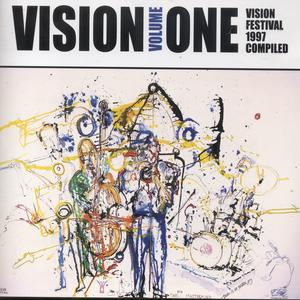 ? Cooper-Moore Quartet -- "Paradox" -- V/A: Vision One: Vision Festival 1997 Compiled (AUM Fidelity, 1998)
? Cooper-Moore Quartet -- "Paradox" -- V/A: Vision One: Vision Festival 1997 Compiled (AUM Fidelity, 1998)
Cooper-Moore grooves on the diddley-bo while Tiye Giraud sings a soulful little chant. Rob Brown on sax and Panar Witcage on percussion add sparkles to the stream.
This CD was the first in what's become a strong series for AUM Fidelity: limited-edition disks capturing sounds of the annual Vision Festival, a triumphant creative-music gathering that NYC artists have kept going for 13 years now.
? Jen Baker -- "Pip Squeak" -- Blue Dreams (Dilapidated Barns, 2008)
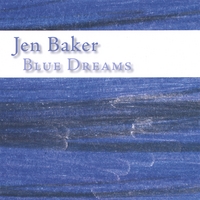 Trombonist Baker set out to create a sound she calls "lyrical
vibrations," based on singing into the trombone while playing. What surprised me, upon hearing the CD, was that she's doing this in toneful settings, basing her improvisations on something close to conventional melody. It's not exactly singalong fare, but I'd expected something more all-out abstract.
Trombonist Baker set out to create a sound she calls "lyrical
vibrations," based on singing into the trombone while playing. What surprised me, upon hearing the CD, was that she's doing this in toneful settings, basing her improvisations on something close to conventional melody. It's not exactly singalong fare, but I'd expected something more all-out abstract.
The combined song/horn sound comes across a bit like Tuvan throat singing, all buzzy and growly. Baker lists the Tuvans as an inspiration, alongside Gregorian chants, of all things.
It's a slow-moving music she's created, purposeful tones meant to stretch
out time and let the mind breathe.
The effect is particularly interesting when the sung tones and the trombone notes go in opposite directions, creating some
interesting criss-crossing double-melodies. The opening minute of the slowish and dramatic "Floor Fuzzy" seems to do that; I also thought I heard it in "Connection Made," but I can't tell on a second listen. That's part of what makes the CD interesting -- trying to fuse the voice and trombone sounds together in my head, but also trying to pick out what's being done on the horn itself.
"Going Up, Chairs Optional" follows in eerie, mysterious tracks that seem appropriate for the sounds Baker's producing, but then you've got a track like "Pip Squeak," which closes the album on an almost danceable note with a didjeridoo-like hoedown sound.
There's a bit of a sameness problem
here -- if you don't enjoy the Lyrical Vibrations sound, you'll have
trouble lasting all 39 minutes -- but that's not much different from
the Tuvan and Gregorian examples, isn't it?
Dilapidated Barns is Baker's own label, but it's also a concept she's fascinated with, having grown up in a rural setting. Check out her non-MySpace Web site for a photo tour of, well, dilapidated barns.
* George Schuller's Circle Wide -- "Survivors' Suite, Part 1" -- Like Before, Somewhat After (Playscape,2008)
? Eric Vloeimans -- "Boom-Petit" -- Boompetit (Challenge, 2007)
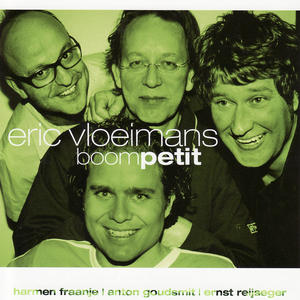 Vloeimans is a Dutch trumpeter who's played in various
mainstream contexts. That includes touches of slick nightlife energy on his
recent album Hyper, but he's also been pouring energy into the trio
Fugimundi, which has a more earthly but distinctly European sound. No
drummer; it's Vloeimans,
Anton Goudsmit (guitar) and
Harmen Fraanje (piano).
Vloeimans is a Dutch trumpeter who's played in various
mainstream contexts. That includes touches of slick nightlife energy on his
recent album Hyper, but he's also been pouring energy into the trio
Fugimundi, which has a more earthly but distinctly European sound. No
drummer; it's Vloeimans,
Anton Goudsmit (guitar) and
Harmen Fraanje (piano).
It's a brand of jazz that draws from European folk and classical traditions,
creating a sidewalk-cafe feel. The trio gets to goof around sometimes,
with the occasional free-jazz touch, or the spaghetti Western guitar that
opens their track "Saya Terkesan," but mostly they produce a polite and
reasonably adventurous front. The Boompetit album adds cellist
Ernst Reijseger for an extra dose of culture and some fun avant-garde scribbling on "Guano."
I was going to play either this track or "Summersault," which starts like a
straightforward children's tune but then goes all akilter in the harmonies,
then adds dashes of calypso and/or psych-surf guitar and some low-hammered
bass piano for some fun.
Vloeimans and Fugimundi will apparently be recording their next CD at
Yoshi's (Oakland) on
Oct. 13. That's also just a $5 cover -- but it's offset by the parking (if
you use the nearby garage) and Yoshi's two-drink minimum. Both can be avoided
by going to the show at Santa Cruz's
Kuumbwa Jazz Center on Oct. 16, although tickets there will
probably cost about $18.
This kind of music was a staple of KZSU's jazz session when I arrived, thanks to the hard work of DJ Klee. Alas, the realities of a crumbling music market, including a dearth in America of CD stores (or of audience) willing to take chances, has dried up a lot of those tributaries for us. Sigh.
Evan Parker -- "Line 2" [excerpt] -- Lines Burnt in Light (Psi,2001)
An album consisting of three long Parker saxophone solos. I believe
each one is an unbroken continuum of notes, the circular breathing trick
that lets a saxophonist keep playing without coming up for air.
We probably own too many tracks of Evan Parker doing this, but
it's irresistable; there's an athletic dimension to it that you don't often
find in music, much less jazz.
If only I could catch the Oct. 17 show of Parker and Greg Goodman (piano)
at Woody
Woodman's Finger Palace. Can't. Not only would it be possibly my
only chance to see Evan Parker, but it's also a rare chance to see
the Finger Palace (Goodman's home, basically), which got profiled
in Tim Perkis'
excellent Noisy
People documentary -- which I was lucky enough to catch
last year.
* Miya Masaoka -- "Part 2" -- While I Was Walking, I Heard a Sound... (
Solo percussion, Gino going nuts on the drums in rapid-fire
touches that are often soft and subtle. It's a musical clatter to be
savored, not a hair-metal series of drum rolls. A classic in the
Bay Area creative-music canon.
Check out this sfSound
program for Oct. 12. Robair is going to do his Potluck Percussion:
you bring it, he'll play it, guaranteed. Naturally, people
see this as a chance to totally mess with him. Jello. Water.
The sky's the limit. (Sky! Hm...)
The program also includes Robair's improv opera,
I, Norton.
I don't know if that means the entire opera, which I would assume has
to be at least medium length, or just a snippet -- or, if by nature,
there's no distinction. The opera has been performed multiple times
before, and Rastascan appears to be readying a CD release. I want to
experience the live thing first before hearing it on disk.
The show is rounded out by a couple of proper modern-classical pieces,
including a premiere of an Erik Ulman
composition. (Ulman is apparently teaching at Stanford, coincidentally.)
Oct. 12, 8:00 p.m., ODC Dance Commons.
*  On the one hand, it makes sense that you wouldn't cover Keith Jarrett's "The Survivors' Suite" shot for shot. If it sounded exactly like the original, you'd go listen to the original. (Coltrane-covering bands, take note.)
On the other hand, it wasn't the combination of notes and chords that
made the album-length "Survivors' Suite" special.
It was the setting: the mood of the music, yes, but also the sense of strength amid bleakness, and the overhanging nuclear fears of the cold war. Even the album cover, with its simple yet fading, despairing tones, contributed.
On the one hand, it makes sense that you wouldn't cover Keith Jarrett's "The Survivors' Suite" shot for shot. If it sounded exactly like the original, you'd go listen to the original. (Coltrane-covering bands, take note.)
On the other hand, it wasn't the combination of notes and chords that
made the album-length "Survivors' Suite" special.
It was the setting: the mood of the music, yes, but also the sense of strength amid bleakness, and the overhanging nuclear fears of the cold war. Even the album cover, with its simple yet fading, despairing tones, contributed.
 loneliness and emptiness, and
loneliness and emptiness, and  ?
?  Trombonist Baker set out to create a sound she calls "lyrical
vibrations," based on singing into the trombone while playing. What surprised me, upon hearing the CD, was that she's doing this in toneful settings, basing her improvisations on something close to conventional melody. It's not exactly singalong fare, but I'd expected something more all-out abstract.
Trombonist Baker set out to create a sound she calls "lyrical
vibrations," based on singing into the trombone while playing. What surprised me, upon hearing the CD, was that she's doing this in toneful settings, basing her improvisations on something close to conventional melody. It's not exactly singalong fare, but I'd expected something more all-out abstract.
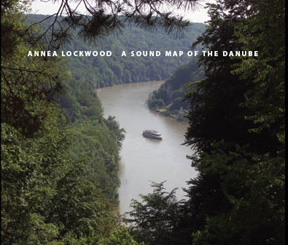 Field recordings of the Danube River: water lapping, boats motoring,
overpasses passing over, people chattering. Many tracks on this 3-CD set also
include short interviews with people who live on, or make their living from,
the Danube. They speak in their native languages, with the river flowing in
the background, so you get a real sonic feel for standing at the river's
banks. It's apparently sequel to A Sound Map of the Hudson River,
which Lockwood compiled in 1989.
Field recordings of the Danube River: water lapping, boats motoring,
overpasses passing over, people chattering. Many tracks on this 3-CD set also
include short interviews with people who live on, or make their living from,
the Danube. They speak in their native languages, with the river flowing in
the background, so you get a real sonic feel for standing at the river's
banks. It's apparently sequel to A Sound Map of the Hudson River,
which Lockwood compiled in 1989.
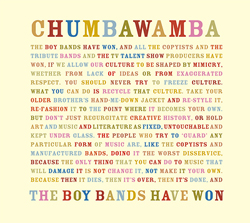 People who know Chumbawamba only for "Tubthumping" will be surprised at
the cleanness, senstivity, and AOR-happiness of this acoustic album. People
who know Chumbawamba only for their anarchist politics will be surprised that
the song "Add Me" -- destined to be this album's hit single, at least at KZSU
-- is so damn funny. The subject is exactly what you think: the worst
guy in the world trying to get added to your MySpace (or whatever) friends.
The melody is cute, charming, and folky. Lyrically, they just pile it on for
three minutes. You can't listen to this without at least cracking a smile.
People who know Chumbawamba only for "Tubthumping" will be surprised at
the cleanness, senstivity, and AOR-happiness of this acoustic album. People
who know Chumbawamba only for their anarchist politics will be surprised that
the song "Add Me" -- destined to be this album's hit single, at least at KZSU
-- is so damn funny. The subject is exactly what you think: the worst
guy in the world trying to get added to your MySpace (or whatever) friends.
The melody is cute, charming, and folky. Lyrically, they just pile it on for
three minutes. You can't listen to this without at least cracking a smile.
 Vloeimans is a Dutch trumpeter who's played in various
mainstream contexts. That includes touches of slick nightlife energy on his
recent album Hyper, but he's also been pouring energy into the trio
Fugimundi, which has a more earthly but distinctly European sound. No
drummer; it's Vloeimans,
Anton Goudsmit (guitar) and
Harmen Fraanje (piano).
Vloeimans is a Dutch trumpeter who's played in various
mainstream contexts. That includes touches of slick nightlife energy on his
recent album Hyper, but he's also been pouring energy into the trio
Fugimundi, which has a more earthly but distinctly European sound. No
drummer; it's Vloeimans,
Anton Goudsmit (guitar) and
Harmen Fraanje (piano).